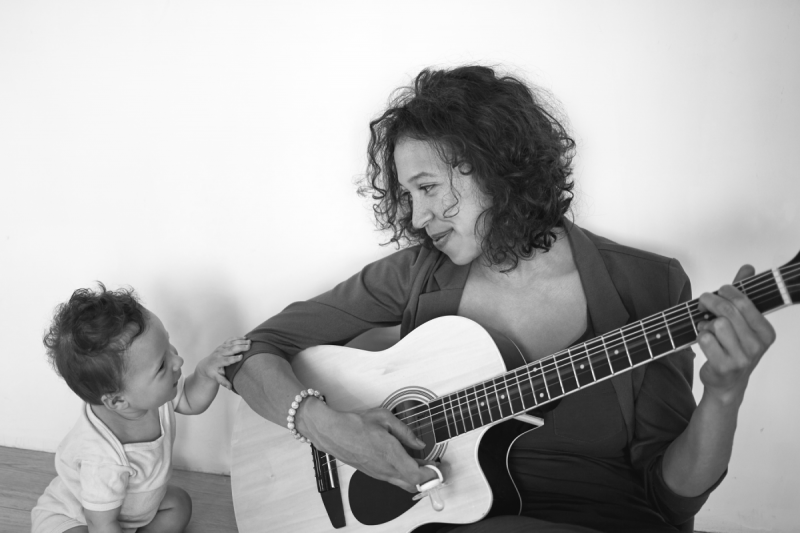7 Tips for Raising a Musical Child
One of the most wonderful forms of self-expression parents can foster within their children is the ability to play music.
by Neil Moore
One of the most wonderful forms of self-expression parents can foster within their children is the ability to play music. Raising a musical child has many advantages — many that can’t be quantified — but just for starters, studies demonstrate that children who learn music are more conscientious and open, test better, and have more ambition.
As a pianist, composer, educator and founder of a multinational music education organization, I’ve spent decades developing curriculums, and I’ve had the privilege of training thousands of music educators around the world. I’ve seen the impact that music education has on people of all ages and, in particular, how profoundly important music education is for young children — preferably starting when they are still in the womb. But why is this so important?
Quite simply, we’re all witnessing the arrival of a technological tsunami that’s altering what it means to be human, with the depth and pace of change transforming almost every area of our lives. The growing consensus among major disciplines is that these advancements in technology will drive the need for the critical attribute of creativity. According to the World Economic Forum’s Future of Jobs report (page 36), creativity is No. 5 on the list of top skills with growing demand for 2025.
We also know that learning how to play an instrument at an early age improves both cognitive and noncognitive functions up to twice as much as dance, theater or sports. We’re also seeing evidence that music education has on our aging brains, and as a large percentage of our population moves into our senior years, music education may well provide the neurological nutrition to help protect our brains from “age-related cognitive declines.”
So, if music education is so important, when and how soon can we start? Frankly, you can start your baby on their musical journey by doing a few simple things before they’re even born. Here are seven things you can do:
1. Sing or hum to yourself and your unborn child. It doesn’t matter whether you do so loudly or quietly just as long as you do it often.
2. Listen to a wide variety of recorded music. Play music when you are in the car, and fill your home with music. Go ahead and play the music you love best, but spend some time reaching for other types of music that you don’t normally listen to.
3. As Professor Harold Hill said in The Music Man, “Think music.” Listen for music when you are walking and listening to other people talking. You’ll soon realize that there is rhythm in the way we walk, cut a loaf of bread or knock on a door, or in the sometimes singsong quality of speech.
4. If you don’t already know how to do so, learn to play an instrument. If you’ve been playing for years, make it a point to play every day. In my experience, playing music can be a powerful source of prenatal communication. What better way is there to “talk” to your unborn child than with the music that you love? Once your baby is born, you’ll want to continue the four basic steps already outlined and add a few more.
5. When you play music, place your baby or toddler close to the instrument. Depending on what you play, perhaps a piano, you might place the child under, near or on the instrument — safely and with proper attention and supervision — so they can feel the vibrations as you play.
6. Dance to music with your baby or toddler in your arms. Let the child feel the music in their body and associate listening to music with the freedom of movement.
7. As soon as you are willing, I recommend enrolling your toddler in an early childhood music and movement program. There are numerous wonderful programs available, and a simple search online for “early childhood music programs” is a great place to start to get an idea of the programs out there.
For the first four or five years of your child’s life, I don’t recommend focusing at all on formal music instruction. It’s becoming more and more clear that, for many children, teens and adults, our traditional “reading-based” approach can often stifle natural music abilities rather than foster them. After decades in the music education field, I can safely say that requiring children to read music before they know how to play an instrument can be counterproductive — it’d be like expecting children to spell before they can talk.
Your child may be ready for music lessons at around the age of five or six. At that point, you should look for a music instructor who allows your child to play a great deal, long before learning to read music. Just search online for “playing-based music methods,” and then, to find the best instructor, interview several and get a sense of who you like and gravitate toward.
Don’t necessarily get caught up in their formal credentials. Select someone you connect with on a personal level. Be certain that this individual plays all sorts of music without needing music notation and that they are willing to teach a variety of musical styles from the very beginning. A helpful question to ask during your interview is: “How large a repertoire will my child be playing after 10 lessons?”
These are some practical and easy-to-implement tips to incorporate music into how you raise your child. Wishing you the very best on your child’s musical journey.
photo: shurkin_son — stock.adobe.com
